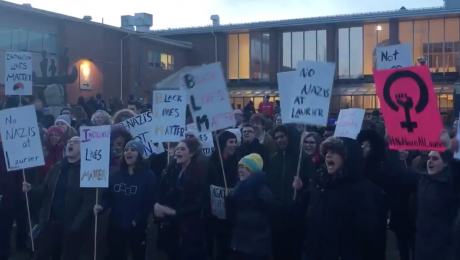Fight Ford!
You are here
Ford’s campus speech crusade is an attack on education and community freedoms

September 27, 2018
Ontario Premier Doug Ford is demanding that universities and colleges across the province adopt so-called “free speech” policies, or risk losing funding. The province has put forward the University of Chicago Statement on Principles of Free Expression as the exemplar of strong speech policies. The Ford government, which only occasionally brought this issue during the campaign, introduced the policy in a response to what they say is a chilling of expression on campus.
Manufactured crisis
In reality, the University Chicago Principles of Free Expression are a deeply ideological tool of the rightwing. Two of the points cited on the province’s website are, “the university/college should not attempt to shield students from ideas or opinions that they disagree with or find offensive,” and, “while members of the university/college are free to criticize and contest views expressed on campus, they may not obstruct or interfere with the freedom of others to express their views.” One could make the disingenuous argument under this directive that trans or Black-only spaces on campus violate the first point, despite their obvious merit in the campus community.
Further, the second point is a fundamental misunderstanding of the role of protest. Political protests are by their nature meant to be disruptive. The freely expressed message by the attendees is usually “we oppose this”—like protests that drove white supremacist Faith Goldy off campus. Ford is attempting to hamstring the ability of politically organized students to push against what they find unacceptable on campus. Compliance with this will turn opposition meek, and allow fringe ideologies which would have never flourished on campus to find a stable home. Ford’s “free speech” dog whistling to the alt-right is transparent enough, having been photographed with white nationalist mayoral candidate and DailyStormer guest Faith Goldy recently.
Campus opposition
Despite the PC government’s protests to the contrary, universities are sometimes the only places where status quo concepts that are taken for granted are challenged. Ryerson’s Center for Free Expression, for example, regularly puts on events countering mainstream narratives on art, surveillance, and Canadian history. CFE director James Turk wrote a scathing rejection of the province’s bully policy titled, “No Thank You, Premier Ford”. EyeOpener editor Jacob Dube sharply rebuked the rightwing-manufactured free speech issue, saying “free speech...doesn’t mean the woman standing in line behind you at Metro has to gleefully listen to your theories about how the arts department is run by lizard people.”
Not all universities have stood up similarly to Ford, perhaps exposing a lack of cross-campus student and academic solidarity. University of Toronto president Meric Gertler welcomed Ford’s move, arguing that U of T’s policies already reflect Ford’s wishes. Meanwhile, the Council of Ontario Universities released a statement praising Ford’s free speech inquisition and promising to “work closely with government.” Of course, the apparent conservative principles of “small government” and non-interference fall by the wayside when the opportunity is presented to strike powerfully against their political opponents.
Accelerating privatization
The government of Ontario still spends significantly on universities, but the percentage of funds coming from the government, i.e. the public, versus students, i.e. private, has shifted dramatically. Neoliberal schemes coated in a veneer of progress, like the 30% tuition rebate program introduced by Wynne, have been uncritically passed on as beneficial.
During the tenure of Dalton McGuinty and Kathleen Wynne’s Liberals, Ontario’s public universities became de-facto private institutions. Ontario now ranks dead last in per-student funding from the province’s grants, receiving 60-70% of the funding levels of other provinces. Perhaps the most obnoxious lie to students on this issue was the Ontario Liberal Party falsely saying time and again that tuition fees had been eliminated for a segment of students. Tuition is absolutely not free.
Any rational student would take the rebate. System-wide, however, the effect has been to shift where universities get the majority of their money from - private individuals.These piecemeal centrist solutions are also notoriously easy to undermine. Ford’s government, or any successor could easily repeal the rebate program on familiar reactionary “pull yourself up by your bootstraps” arguments. An equivalent increase to the 30% rebate in public investment in universities - perhaps to lower tuition fees - would have been much harder to dismantle.
Ford’s austerity-championing government may use “free speech” as a smokescreen for public cuts. Post-secondary institutions that do not comply with Ford’s dictate have been threatened as such. The actual mechanism by which the defunding would take place is unclear. This authoritarian tactic of suppression has been employed by Trump and other faux “free speech” warriors to bully universities. During Ford’s premiership campaign he did not articulate what he thought free speech violations would be.
Community opposition
But Ford’s policy could backfire. Ford’s anti-educator snitch line for public school teachers has been the target of organizing campaigns by pro-educator, pro-sex ed activists. Institutions that are truly interested in the well being of their students will instead dedicate themselves to ensuring that hateful and violent figures are not used as lightning rods for organizing bigotry, and that there is no interference with an organized response from the community.
Beyond the defiance of certain professors institutions, one can imagine the law being futile under community action. What does the province propose will be done when, for example, an oil executive is denied a pulpit at a college known for environmental education? Will the cavalry come with riot gear to force the speech to happen, against the wishes of the students at that very campus? If a public figure is known by the community to be so heinous as to inspire mass organization to keep them away, what right does the province have to tell that community, “shut up and put up with it?” Like the mass high school student walkouts against Ford’s attacks on sex ed, campus organizing can expose Ford’s faux free speech crusade and push back against austerity.
Section:
Topics:









